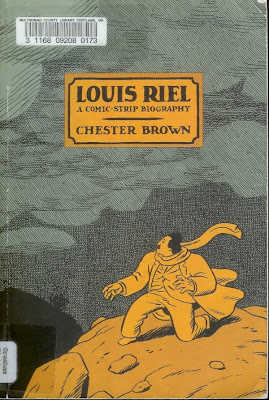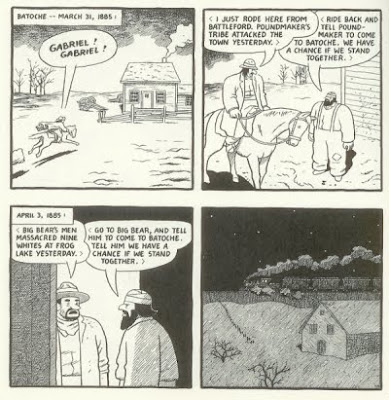
Louis Riel: A Comic-Strip Biography
by Chester Brown
I am strongly drawn to histories in cartoon form, but almost always a little disappointed by them. The problem is that the leading work in the genre -- Larry Gonick's many-volumed Cartoon History of the Universe -- is so outrageously good that it is hard for anyone else to compete. Gonick's books are treasures, and I would never wish them away, but the field of non-fiction cartooning might be a little more healthy if its pioneer hadn't set the bar quite so high.
Louis Riel is the biography of a Canadian populist, rebel, and, arguably, nut-job who was involved in two local conflicts during Canada's late 18th Century expansion onto the prairies. He led working-class, French-speaking, Metis inhabitants of the prairie provinces in their struggles against the great powers of the Canadian government and the Canadian Pacific Railroad. Students of westward expansion anywhere in the Americas will not be suprised to learn that minorities and those who opposed the expansion of capitalism and its attendant systems, here as elsewhere, end up with a fairly raw deal.
Brown's treatment of this history attempts a factual, relatively "literal" retelling, and makes no particular effort to be funny. Me, I'm old-fashioned -- I prefer comics that are, you know, comic, so as a matter of taste Louis Riel is not especially my cup of tea. I can attest that it is well-drawn in a style reminiscent of Tintin, albeit in stark black and white. As far as I can tell it is quite well researched. The incidents in question illustrate some of the real concerns and conflicts of "The West," which is nice; Western history has been so buried under more than a century's worth of competing mythologies that any glimpse at actual documented incidents is always full of surprises. Learning about the expansionist phase of Canadian history, furthermore, is a good exercise for those United Statesians who always imagine a halo floating up there above the Maple Leaf.

This particular work of "comix history" did not ~wow~ me, especially, but it illustrates the strength of the form: in a short evening, I went from total ignorance of a historical episode to having a comfortable layman's understanding of what happened and why it was significant. Thanks, Chester Brown! I salute Louis Riel as a successful effort in an important and underdeveloped genre. I would love to see many, many more books like this one.
by Chester Brown
I am strongly drawn to histories in cartoon form, but almost always a little disappointed by them. The problem is that the leading work in the genre -- Larry Gonick's many-volumed Cartoon History of the Universe -- is so outrageously good that it is hard for anyone else to compete. Gonick's books are treasures, and I would never wish them away, but the field of non-fiction cartooning might be a little more healthy if its pioneer hadn't set the bar quite so high.
Louis Riel is the biography of a Canadian populist, rebel, and, arguably, nut-job who was involved in two local conflicts during Canada's late 18th Century expansion onto the prairies. He led working-class, French-speaking, Metis inhabitants of the prairie provinces in their struggles against the great powers of the Canadian government and the Canadian Pacific Railroad. Students of westward expansion anywhere in the Americas will not be suprised to learn that minorities and those who opposed the expansion of capitalism and its attendant systems, here as elsewhere, end up with a fairly raw deal.
Brown's treatment of this history attempts a factual, relatively "literal" retelling, and makes no particular effort to be funny. Me, I'm old-fashioned -- I prefer comics that are, you know, comic, so as a matter of taste Louis Riel is not especially my cup of tea. I can attest that it is well-drawn in a style reminiscent of Tintin, albeit in stark black and white. As far as I can tell it is quite well researched. The incidents in question illustrate some of the real concerns and conflicts of "The West," which is nice; Western history has been so buried under more than a century's worth of competing mythologies that any glimpse at actual documented incidents is always full of surprises. Learning about the expansionist phase of Canadian history, furthermore, is a good exercise for those United Statesians who always imagine a halo floating up there above the Maple Leaf.

This particular work of "comix history" did not ~wow~ me, especially, but it illustrates the strength of the form: in a short evening, I went from total ignorance of a historical episode to having a comfortable layman's understanding of what happened and why it was significant. Thanks, Chester Brown! I salute Louis Riel as a successful effort in an important and underdeveloped genre. I would love to see many, many more books like this one.


7 comments:
I disagree that this was not funny. I mean, it's mostly serious and often quite dark. But I definitely laughed some, even in the darkness. The dude swearing / uttering racial slurs in prison made me laugh — he's quite committed to it. And all the Xs instead of speech. Excellent. But I think that the whole thing would have been better as a Much, Much shorter story.
Hmm, well, the real story of Louis Riel (and the unfortunate people who followed him) is pretty unfunny... but what makes me curious: why on earth pick THIS particular sad story to tell? (Is the cartoonist/writer a Canadian? A French-Canadian?)
More importantly, the Wednesday Quiz was never scored! Don't make us Google to find the answers!! We were expecting A Major Prize!!!
Was Tintin the German Shephard, or was that Rin Tin Tin? Hey, I have a research project for you, and I called you out by name on my current blog . . .
I think you would have to read several stories, comic strip or otherwise, of Louis Riel to get anywhere close to what happened. Was he a martyr to a just cause? Mentally ill? A traitor? A patriot? I'm still not sure. He was someone who did things, and I wish he'd had a chance to actually serve in parliament. No one can say that he did not do everything he could to effect change. But the Métis still get a raw deal.
Dr. Noisewater: Tintin was the boy reporter with the pointy hair and the little white dog in the French comic books. I can see him helping Riel.
Louis Riel and the Metis (how DO you get an accent in there?) were absolutely justified in their protests and efforts to establish a separate identity. The British had very...different... concepts when it came to managing colonies and "subject peoples," compared to the French, aside from blatant racism. Riel was hardly the first leader to have great ideas but poor skills; it was tragic.
The new push for graphic novels...I wonder if it will last?
I toggle an icon on my status bar to flip the keyboard into "Canadian French" mode, and then the / key gives me a é just like that. I can also get one by typing e then ' then the Insert key, but the former is presumably because I bought the computer in Canada, and the latter because I run an app called abc tajpu which allows me to summon letters and accents from a number of alphabets. Lacking these features you can get accented characters by copy-pasting them out of other people's messages or by holding down the ALT key and whaling on your numberpad. Being married to a laptop I don't have a numberpad, so I don't know the code you need for an é-acute.
@Avi: "I think you would have to read several stories, comic strip or otherwise, of Louis Riel to get anywhere close to what happened."
Well, this depends on how close "anywhere close" is. I know enormously more than I did two weeks ago, and enough to articulate a general idea of what, where, and when happened, with a reasonable shot at why and so what. I could certainly learn more; Brown gives me an annotated bibliography that could get me started. For that matter, I could devote the rest of my life to studying the matter (if independent means or a post teaching Canadian History allowed). But for my present purposes, I feel like Brown delivers a pretty good sufficiency of information, and -- equally important -- a pretty good sense of where the gaps and ambiguities in the record are.
A case could be made that somebody who already knew about Louis Riel would be a better judge of Brown's book, and that case have a lot of merit. That's not the audience Brown's book is FOR, though.
"I run an app called abc tajpu which allows me to summon letters and accents from a number of alphabets."
I think you and nichim would get along....
Post a Comment